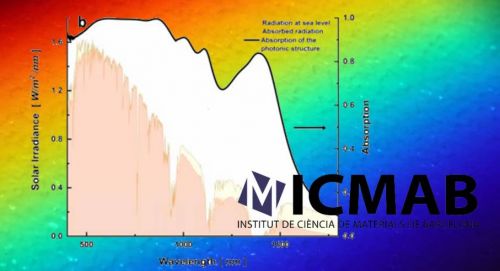
15/02/2018
ICMAB traps sunlight with superabsorbent nanomaterials
ICMAB traps sunlight with superabsorbent nanomaterials
In renewable energies, increasing efficiency is a key challenge in the production of “photovoltaic” electrons. This includes elaborating materials that can absorb the largest possible sunlight spectrum.
Great news from the Institute of Materials Science of Barcelona (ICMAB), a Barcelona Synchrotron Park’s partner: researchers led by Dr. Agustín Mihi, have created materials that largely absorb a wide range of the solar spectrum, between 400 and 1500 nm (visible light and infrared radiations), using an ultrathin layer of less than 100 nm thick of material.
The followed strategy, low cost and fully scalable, is based on combining the thin layer deposition of semiconductors on metals, and the nanostructuring of the material forming photonic crystals. The obtained superabsorbers materials have many potential applications, especially in the field of photovoltaic energy and photodetection.
Moreover, the researchers provide, in the study published in Advanced Materials, the design guidelines to synthesize other types of materials following the same strategy.
Great news from the Institute of Materials Science of Barcelona (ICMAB), a Barcelona Synchrotron Park’s partner: researchers led by Dr. Agustín Mihi, have created materials that largely absorb a wide range of the solar spectrum, between 400 and 1500 nm (visible light and infrared radiations), using an ultrathin layer of less than 100 nm thick of material.
The followed strategy, low cost and fully scalable, is based on combining the thin layer deposition of semiconductors on metals, and the nanostructuring of the material forming photonic crystals. The obtained superabsorbers materials have many potential applications, especially in the field of photovoltaic energy and photodetection.
Moreover, the researchers provide, in the study published in Advanced Materials, the design guidelines to synthesize other types of materials following the same strategy.
More news
03/08/2016
Pier 01, the new Barcelona technology hub
28/07/2016
Zero 2 Infinity sends satellites into space
22/07/2016
Latest SENER News From Space and the Sun
16/07/2016
Les Dames de Cerdanyola
08/07/2016
The ALBA Synchrotron reveals the inside of hepatitis C-infected cells
30/06/2016
The Bioinformatics Barcelona Initiative









